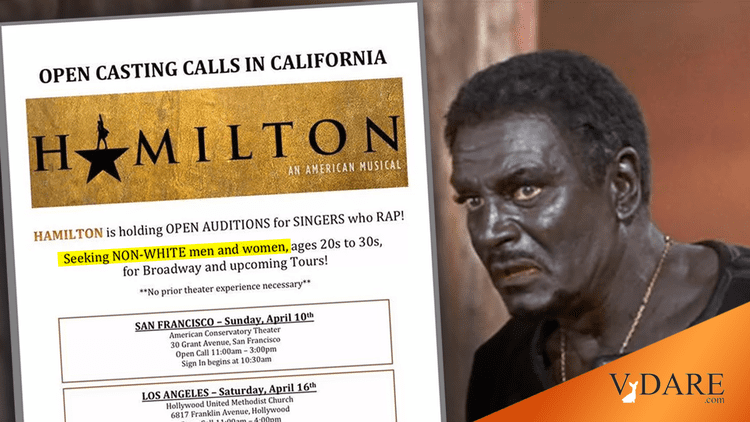


07/10/2020
From the New York Times:
‘Hamilton,’ ‘The Simpsons’ and the Problem With Colorblind Casting
Animated shows are finally moving away from letting white actors play characters of color. But even well-intentioned efforts at increasing diversity create complications.
By Maya Phillips
July 8, 2020Late June brought news that the animated shows “The Simpsons,” “Family Guy,” “Big Mouth” and “Central Park” would recast characters of color who have been played by white actors.
A week later “Hamilton” dominated the cultural chatter on Independence Day weekend when Disney+ premiered the film version of the Broadway phenomenon.
In both situations performers inhabited characters of racial backgrounds that were different from their own, often referred to as “colorblind casting.” …
Still, the difference between the two lies in their approaches to the all-encompassing nature of whiteness in American industries and narratives. Whereas the world of voice-acting for animation is just another dominated by white workers, casting a person of color as a typically white character is an act of subversion, a normalization of something other than the white standard. The Black and brown founding fathers of “Hamilton” make the story of America something that can finally be owned by people of color, as opposed to the reality, which so often refutes the relevancy of their lives and contributions.
Though egalitarian in theory, colorblind casting in practice is more often used to exclude performers of color. It’s a high-minded-sounding concept that producers and creators use to free themselves of any social responsibility they may feel toward representing a diverse set of performers.
The history of the practice in live-action takes is more egregious, and has been well-documented: Mickey Rooney’s notorious Asian landlord in “Breakfast at Tiffany’s”; Alec Guinness’s Arab prince in “Lawrence of Arabia”;
Perhaps my favorite supporting performance of all time:
Laurence Olivier in blackface as Othello. ..
It seems needless to say, and yet, here it is: Any casting of a performer in the role of a race other than their own assumes that the artist step into the lived experience of a person whose culture isn’t theirs, and so every choice made in that performance will inevitably be an approximation. It is an act of minstrelsy.
The fact that Ariel is white has nothing to do with her story about wanting to be with her love and walk on land.
Well, Ariel, the Little Mermaid is by Danesman Hans Christen Andersen.
The casting of a Black actress to play Hermione Granger in the play “Harry Potter and the Cursed Child” provoked howls from many fans, but the character’s whiteness never had any bearing on her brilliance. In fact, stories that do not take their characters’ whiteness as a given may find fresh relevance and invite new audiences into their sphere, because for so many people of color, they don’t get to see themselves represented in the media they consume.
But however well-intentioned, there are complications that come with works that aim to use colorblind casting to highlight people of color who wouldn’t otherwise be represented. Creators may cast blind, thinking their job done, failing to consider that a Black man cast as a criminal or a Latina woman cast as a saucy seductress — even when cast without any regard to their race — can still be problematic. One kind of blindness can lead to another.
And then there’s also the “Hamilton” problem. The show may place diverse bodies on the stage, but productions that would subvert a narrative traditionally owned by white characters must not just tag in actors of color but reconsider the fundamental way the new casting changes the story. In “Hamilton,” the revision of American history is dazzling and important, but it also neglects and negates the parts of the original story that don’t fit so nicely into this narrow model. The characters’ relationship to slavery, for example, is scarcely mentioned, because it would be incongruous with the triumphant recasting of our country’s first leaders. (The “Hamilton” star and creator Lin-Manuel Miranda responded to this criticism this week, calling it “valid.”)